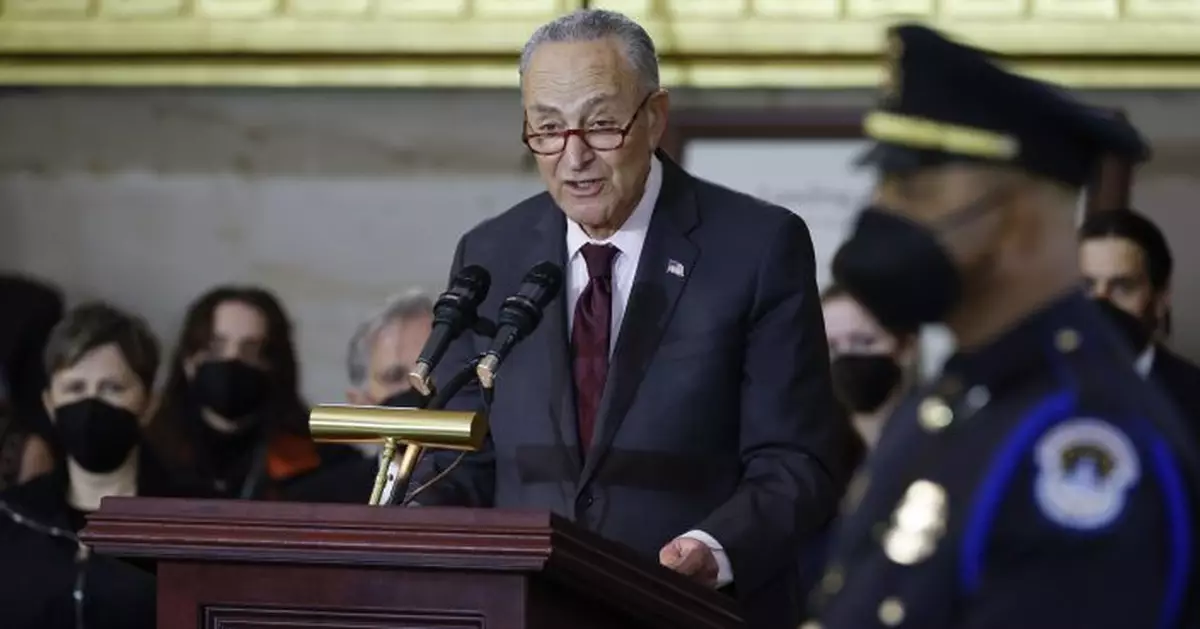President Joe Biden is set to meet privately with Senate Democrats at the Capitol on Thursday, hoping to deliver a jolt to their long-stalled voting and elections legislation despite the long odds still facing the top party priority.
Since taking control of Congress and the White House last year, Democrats have vowed to counteract a wave of new state laws, inspired by Donald Trump’s false claims of a stolen election, that have made it harder to vote. But after an initial flurry of activity, their efforts have stalled in the narrowly divided Senate, where they lack the 60 votes to overcome a Republican filibuster.
Biden's visit is the latest in a concerted effort by Senate Democrats and the White House to breathe new life into the endeavor and build support for changing filibuster rules to help advance the legislation.
Republicans excoriate it all as a “power grab.”
There are key holdouts among Senate Democrats as well. Moderate Sens. Joe Manchin of West Virginia and Kyrsten Sinema of Arizona have both said they oppose doing away with the Senate’s 60-vote threshold to overcome a filibuster and pass legislation.
They argue such a change would allow for drastic reversals in federal policy when the Senate changes party control. They say the changes would come back to haunt Democrats once they are in the minority, as they would no longer have the ability to block legislation.
On Tuesday Biden gave a fiery speech in Atlanta, likening opponents of the legislation to racist historical figures and telling lawmakers they will be "judged by history.”
On Thursday, Senate Majority Leader Chuck Schumer said on the chamber floor, “If the right to vote is the cornerstone of our democracy, then how can we in good conscience allow for a situation in which the Republican Party can debate and pass voter suppression laws at the state level with only a simple majority vote, but not allow the United States Senate to do the same?”
Democrats have shifted their strategy in order to push the legislation forward. They will use existing Senate rules in an effort to bypass the Republican filibuster that has prevented them from formally debating the bill on the chamber's floor. They hope to force a public showdown that could stretch for days and carry echoes of civil rights battles a generation ago that led to some of the most famous filibusters in Senate history.
But the new approach also does little to resolve the central problem Democrats face: They lack Republican support to pass the elections legislation on a bipartisan basis, but also don’t have support from all 50 Democrats for changing the Senate rules to allow passage on their own.
Republicans are nearly unanimous in opposing the legislation, viewing it as federal overreach that would infringe on states’ abilities to conduct their own elections. And they’ve pointed out that Democrats opposed changes to the filibuster that Trump sought when he was president.
“Nobody in this country is buying the fake hysteria that democracy will die unless democrats get total control,” Senate Minority Leader Mitch McConnell, R-Ky., said Thursday.
The Democratic package of voting and ethics legislation would usher in the biggest overhaul of U.S. elections in a generation, striking down hurdles to voting enacted in the name of election security, reducing the influence of big money in politics and limiting partisan influence over the drawing of congressional districts. The package would create national election standards that would trump the state-level GOP laws. It would also restore the ability of the Justice Department to police election laws in states with a history of discrimination.
For Democrats and Biden, the legislation is a political imperative. Failure to pass it would break a major campaign promise to Black voters, who helped hand Democrats control of the White House and Congress, and would come just before midterm elections when slim Democratic majorities will be on the line. It would also be the second major setback for Biden's agenda in a month, after Manchin halted work on the president's $2 trillion package of social and environmental initiatives shortly before Christmas.
Schumer had initially set the Martin Luther King Jr. holiday, on Jan. 17, as a deadline to either pass the voting legislation or consider revising the filibuster rules. That vote could still happen.
But under their new strategy, which uses a procedural shortcut, they will be able to actually hold a debate on the bill without being blocked by a filibuster, which Republicans have deployed four times in recent months to stop debate.
The mechanics work like this: The House on Thursday amended an unrelated bill that had already approved both chambers of Congress, combining Democrats two separate voting bills into one. Now that the House has passed that bill, the Senate can debate the measure with a simple majority, bypassing a filibuster. But they Senate Republicans can still block them from holding a final vote.
After the debate on the bill, Schumer said Democrats still plan to consider changes to the filibuster.
But Manchin, who played a major role writing Democrats' voting legislation, threw cold water on the hopes Tuesday, saying any changes should be made with substantial Republican buy-in — even though there aren’t any Republican senators willing to sign on.
That befuddled South Carolina Rep. Jim Clyburn, the No. 3 Democrat in the House and a senior member of the Congressional Black Caucus.
Clyburn questioned the wisdom of reflexively seeking bipartisanship, noting that the right to vote was granted to newly freed slaves on a party-line vote.
“He seems to be supporting a filibuster of his own bill," Clyburn said of Manchin. “That, to us, is very disconcerting.”
AP Congressional Correspondent Lisa Mascaro contributed.


